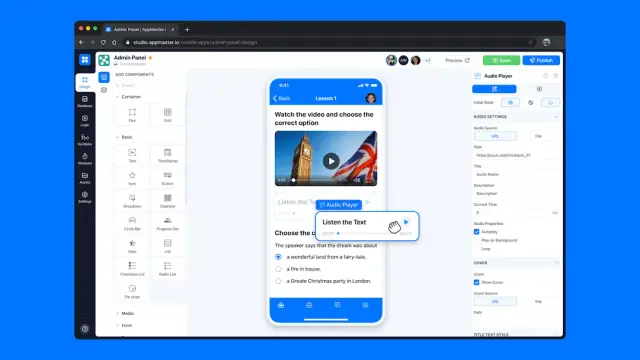How Does OpenAI Elevate The Creativity of App Designers?
Discover how OpenAI technology elevates app designers' creativity in app design using powerful AI tools, improving collaboration, efficiency, and reducing technical barriers in the no-code era.

The Role of AI in App Design
The app design process has significantly transformed over the years with the rise of AI technologies. AI plays a pivotal role in enhancing the capabilities of app designers by automating tasks, generating ideas, improving collaboration, and reducing technical barriers. By leveraging AI-powered tools, designers can unleash their creative potential in ways previously unimagined, resulting in improved app performance and user experience. Here we dive into how AI contributes to the app design process.
Automating Routine Tasks
One of the most prominent features of AI is its ability to automate routine tasks. By introducing automation into app design, designers can focus on more value-driven work, such as brainstorming, concept ideation, and user testing. AI-powered tools can help automate mundane tasks, such as creating layout grids, aligning elements, or even generating color schemes and styles.
AI-driven Idea Generation
AI-driven tools can analyze vast amounts of data and patterns to generate ideas and suggestions tailored to the specific project. These tools can provide designers with fresh insights and perspectives, enabling them to develop unique and innovative app designs. With AI assistance, app designers can quickly explore various design concepts and ideas based on user preferences, industry trends, and other factors.
Enhancing Collaboration
AI can significantly improve the efficiency and effectiveness of collaboration among teams. AI-powered systems can instantly analyze and communicate the team's needs, objectives, and progress, ensuring everyone stays aligned and focused on the project goals. Furthermore, AI-driven collaboration tools can help in detecting potential design discrepancies and providing real-time feedback, leading to a more streamlined design process.
Reducing Technical Barriers
AI can help reduce the technical barriers that often impede the creative flow of app designers. With AI-powered design tools, designers can work with complex tasks without delving into intricate coding and technical hurdles. This smooth, user-friendly interaction with powerful development platforms allows designers to turn their creative ideas into fully functional apps easily.
Advantages of AI-Powered Design Tools for App Designers
AI-powered design tools have many benefits that can drastically transform the app design sphere. Here are some of the most significant advantages that app designers can extract from AI-driven tools:
- Quicker Ideation and Execution: AI-powered tools enable swift idea generation and execution, significantly reducing development time. By leveraging AI's capabilities in comprehending user needs and providing personalized suggestions, designers are equipped with better tools to quickly create high-quality, user-centric designs.
- Automated Tasks and Smart Predictions: AI-assisted design tools can effectively automate tasks like generating assets, managing design libraries, or predicting user behaviors. This increased automation speeds up the design process while improving consistency, reducing human errors, and offering a seamless workflow.
- Personalized User Experiences: AI-driven design tools can draw insights from user data and behavior patterns to create personalized experiences within the application. Personalization is crucial to an app's success, and AI can help app designers create interactive interfaces tailored to individual user needs and preferences, resulting in higher engagement and satisfaction.
- Resource Optimization: AI-powered tools can optimize design resources, such as memory, CPU, and battery utilization. By intelligently managing resource-heavy operations, AI systems ensure that the apps run smoothly across various devices while consuming minimum resources.
- Efficient Collaboration: AI-driven platforms can enhance collaboration among design teams. These tools can synchronize work across different designers, streamline communication, provide real-time feedback, and facilitate effective teamwork.

OpenAI and the No-Code Movement
The no-code movement's emergence has revolutionized how we build and deploy applications. By eliminating the need for traditional coding, anyone can now create complex applications using visual tools and pre-built components. OpenAI technology contributes to the no-code movement by further enhancing the capabilities of no-code design tools, platforms, and systems that streamline the app development process.
AI technology like OpenAI can be integrated with no-code platforms to provide advanced features and insights. Designers can leverage OpenAI-powered platforms to create modern, interactive applications without writing a single line of code. By integrating AI systems into no-code environments, developers can access a plethora of innovative solutions that revolutionize the traditional development process:
- AI-generated components and templates: OpenAI can be trained to generate reusable components and templates based on user preferences, making it easier for app designers to quickly create unique, feature-rich applications.
- Smart predictions and recommendations: OpenAI can predict user trends and preferences. By accessing this valuable information, app designers can create more personalized, engaging apps that resonate with their target audience.
- Advanced data analysis: OpenAI enables designers to analyze user behavior, application performance, and adoption rates, empowering them with valuable information to make data-driven decisions.
- Improved accessibility: OpenAI can optimize applications for different devices, screen sizes, and accessibility needs, ensuring that the apps cater to a diverse audience.
As the no-code movement continues to gain traction, including OpenAI and other AI technologies will continue to push the boundaries of app design and development.
Boosting the Creativity of App Designers with AppMaster
AppMaster is an innovative no-code platform that empowers app designers to create powerful web, mobile, and backend applications using an intuitive visual interface. By harnessing the potentials of AI and no-code technologies, AppMaster is geared towards boosting the creativity of app designers while reducing their dependence on traditional coding.
Several AI-powered features stand out in the AppMaster platform, making it easier for app designers to create powerful, scalable, and efficient applications with minimal technical barriers:
Visual Business Processes and Drag-and-Drop Components
AppMaster offers a versatile visual BP Designer for app designers to create business logic without writing any code. This feature leverages the convenience of AI-powered drag-and-drop components, allowing you to construct complex processes within a few clicks. By eliminating the need for traditional coding and automating parts of the app creation process, app designers can focus more on their creative ideas and delivering unique user experiences.

Code-less Logic Building
Beyond drag-and-drop components, AppMaster simplifies app design further with code-less logic building capabilities. App designers can visually create rules, conditions, and actions using an intuitive interface with less reliance on traditional coding. AI-driven predictions and tools assist you in developing the logic structure, reducing the learning curve and technical barriers for creating scalable and efficient applications in a fraction of the time.
Rapid Application Generation
Through the power of AI, AppMaster enables rapid application generation, allowing app designers to visualize their ideas faster. By automating the app creation process, the platform can generate fully functional web, mobile, and backend applications from scratch while eliminating any technical debt. This means that app designers can iterate and improve their prototypes at an accelerated pace, embracing a mindset of experimentation and continuous improvement.
Improving Collaboration and Efficiency
AppMaster's AI-driven platform promotes collaboration among app designers, stakeholders, and developers, making communication and feedback easier to exchange, track and implement. AI-powered tools assist in finding and managing resources, optimizing processes, and keeping everyone on the same page. This streamlined workflow speeds up development, reduces miscommunication, and gives app designers more time to focus on the creative aspects of their projects.
AppMaster showcases the power of AI and no-code technologies in elevating the creativity of app designers. The platform equips designers with the tools, features, and collaborative environment necessary to design remarkable applications, enabling them to unleash their full potential while minimizing the reliance on technical skills and coding expertise.
Future Prospects for AI and App Design
As the integration of AI and app design becomes more prevalent, we can expect several remarkable advancements in the future of app design. The impact of OpenAI and other artificial intelligence technologies will continue to evolve, transforming the way app designers approach their craft and the quality of the applications they create.
Advanced AI-Driven Design Tools
App design tools will continue to be enhanced by AI, offering more advanced functionalities, greater ease of use, and better integration with other design platforms. AI-powered features will become more sophisticated and personalized, helping app designers more effectively and efficiently explore and develop concepts.
Improved Predictions and Personalization
As AI algorithms become more intelligent and accurate in predicting user behavior, app designers will have access to a wealth of insightful data to inform their design decisions. This will lead to more personalized and tailored user experiences, higher levels of engagement, and applications that truly cater to individual users' preferences and needs.
Better Accessibility
In the future, AI-driven app design will further enhance accessibility, allowing app designers to create applications that cater to a broader range of users with diverse requirements. This will encourage a more inclusive design philosophy, enabling applications to seamlessly cater to all types of users, irrespective of their abilities or limitations.
Seamless No-Code Integration
With the continued rise of no-code platforms like AppMaster, AI and app design will become increasingly intertwined. AI-driven design tools will be seamlessly integrated into no-code environments, unlocking the full potential of app designers without needing coding expertise. This will democratize the app design process, making it more accessible and empowering more individuals to express their creativity through app development.
The future prospects for AI and app design are both exciting and promising. As OpenAI and other artificial intelligence technologies continue to interconnect with no-code platforms, app designers will be given unprecedented opportunities to unleash their creativity and develop extraordinary applications that cater to a global audience. The continuous advancements in AI and app design will transform the industry, leading to a more efficient and collaborative environment that elevates the art of app development to new heights.
FAQ
AI in app design helps automate tasks, generate ideas, improve collaboration, and reduce technical barriers for app designers, enhancing their creativity and efficiency.
Advantages of AI-powered design tools include quicker ideation, automated tasks and smart predictions, personalized user experiences, resource optimization, and efficient collaboration.
OpenAI contributes to the no-code movement by enhancing the capabilities of design tools, platforms, and systems, helping users build complex applications without writing traditional code.
AppMaster leverages AI-powered features, such as Business Processes, drag-and-drop components, code-less logic building, and rapid app generation, to easily enable app designers to create fully functional web, mobile, and backend applications.
Future prospects for AI and app design include more advanced AI-driven design tools, greater accuracy in predictions, improved personalized experiences, better accessibility, and more seamless integration with no-code platforms.





